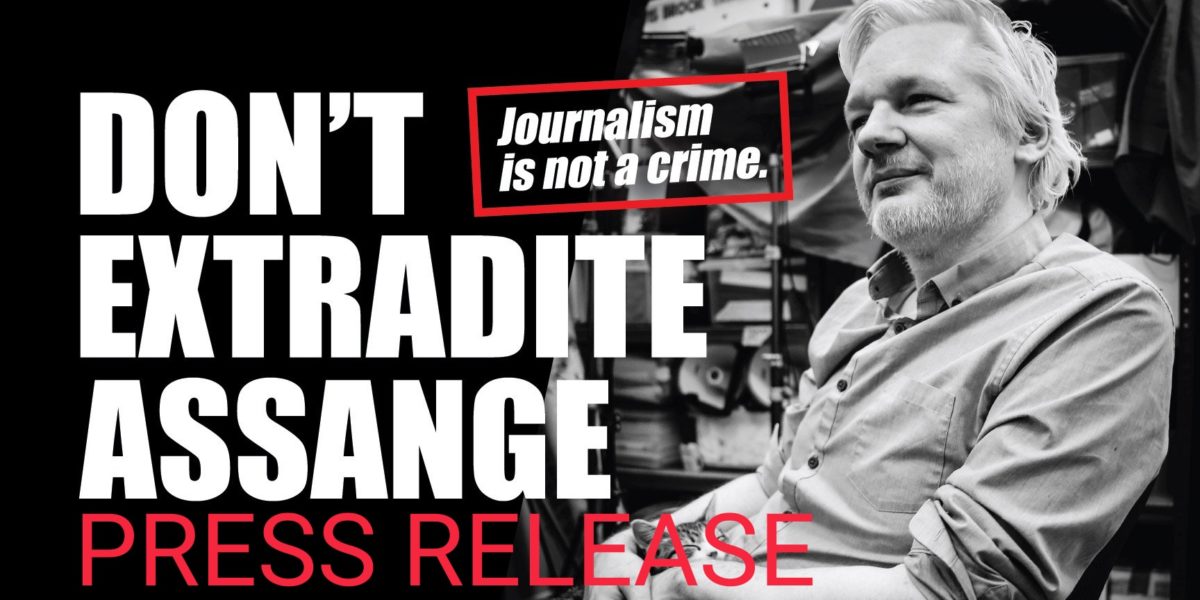13. 08. 2020
US Attorney General William Barr has issued a replacement extradition request for Julian Assange.
Assange was notified today, just three weeks before the full extradition hearing is scheduled to resume on 7th September. The hearing began in February and lasted one week.
The reissued extradition request contains the same 18 charges and 175 year-sentence as before.
170 years relate to receiving and publishing the so-called Chelsea Manning leaks, which revealed evidence of war crimes and serious human rights violations. The lesser charge carries a 5 year sentence and is not clearly defined.
At an administrative hearing on 27 July Assange’s lawyers said that the apparent intention to introduce a changed extradition request half-way into Assange’s extradition case appeared to be an attempt by the Trump administration to derail the case and force the postponement of the hearing until after the US election, which will take place on 3 November.
‘Barr is instrumentalising the UK justice system to avoid political embarrassment ahead of the US election’ said WikiLeaks ambassador Joseph Farrell.
‘The question is, why is the Trump Administration afraid of Julian’s case being heard before the US election? ‘.
Julian Assange has not seen his lawyers since March. His lawyers argue that lack of access to their client since his arrest has severely undermined their ability to prepare his case, and since prisons denied legal visits in March this problem has become much worse.
It is unlikely that Julian Assange will have been able to see his lawyers for an entire 6 month period before the extradition hearing restarts in September.
Julian Assange’s fiancee and their children, aged 1 and 3, have not been able to visit Assange, who is an unconvicted ‘remand’ prisoner, for the past five months.
Julian Assange is expected to appear at the final procedural hearing at Westminster Magistrates’ court on Friday 14 August via videolink. He had previously not appeared after following doctors’ advice related to underlying health problems combined with a chest infection, which made him especially vulnerable to Covid.
During this period, UK authorities finally supplied Julian Assange with a largely non-functional computer. Assange cannot type notes for his lawyers because the computer keys are glued down and all text-editing programs have been removed from the computer.
The Don’t Extradite Assange campaign said ‘Given that the replacement extradition request contains the same 18 charges and 175 year sentence, the purpose appears to be to force a postponement to the extradition hearing and as part of a larger PR strategy.’
Background
Julian Assange’s extradition hearing is due to re-start on 7 September 2020 at the Old Baily and is anticipated to last for at least three weeks.
Julian Assange is charged by the US administration for publications exposing war crimes and human rights abuses for which he faces a 175 years sentence.
Julian Assange’s lawyers have experienced a considerable difficulty communicating with their client. Speaking at a recent hearing, Edward Fitzgerald QC, said ‘We’ve had great difficulties in getting into Belmarsh to take instructions from Mr Assange and to discuss the evidence with him.’ Mr Fitzgerald continued: ‘We simply cannot get in as we require to see Mr Assange and to take his instruction.’
The UN working group on arbitrary detention issued a statement saying that “the right of Mr. Assange to personal liberty should be restored”.
Massimo Moratti of Amnesty International has publicly stated on their website that, “Were Julian Assange to be extradited or subjected to any other transfer to the USA, Britain would be in breach of its obligations under international law.”
Human Rights Watch published an article saying, “The only thing standing between an Assange prosecution and a major threat to global media freedom is Britain. It is urgent that it defend the principles at risk.”
The NUJ has stated “US charges against Assange pose a huge threat, one that could criminalise the critical work of investigative journalists & their ability to protect their sources”.

